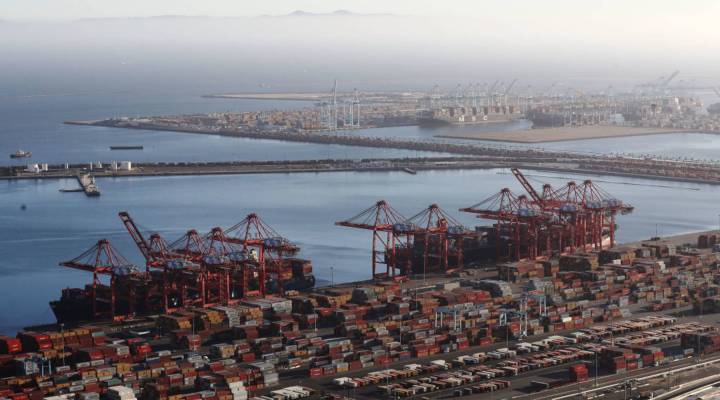
Want to know the nitty-gritty on tariffs? Ask a customs broker
Want to know the nitty-gritty on tariffs? Ask a customs broker

We’ve been talking a lot about tariffs in the last several months and trying to answer your questions while we’re at it. In doing so, we’ve reached out to a lot of people whose day-to-day jobs have been shaped by the rounds of tariffs, the latest of which went into effect this week on more than 5,000 Chinese products. Gretchen Blough is a customs broker at Logistics Plus Inc. in Erie, Pennsylvania, and she answered some listener questions about tariffs and talked to Marketplace host Kai Ryssdal about how the trade war has changed her job. The following is an edited transcript of their conversation.
Kai Ryssdal: Can I do a little listener with you, please?
Gretchen Blough: Sure.
Ryssdal: OK, and I apologize for putting you on the spot. We get a lot of questions from listeners. The two most basic ones are: Who pays these tariffs?
Blough: Well, they eventually get passed along to the consumer. The importer initially pays them. But I strongly suspect everyone is going to be paying them soon.
Ryssdal: Question No. 2 is: Where does that money go?
Blough: That goes into the general fund. So it doesn’t necessarily go to pay anything customs-related.
Ryssdal: But the general treasury is where it goes, right?
Blough: Right.
Ryssdal: So what exactly does a customs broker do?
Blough: Well, I end up explaining this to a lot of people —
Ryssdal: I’m sure you do, and I apologize.
Blough: That’s OK. So we have to take a very extensive test and go through a licensing program, and then we get to file the entries on all of the commodities coming into the U.S. And we have to classify everything, we have to make sure it’s valued properly, we have to make sure all the details that an importer gives us are correct. And then we submit that to Customs, and either the importer pays the duties directly or we pay it on their behalf and then charge the importer. And then we make sure everything is taken care of.
Ryssdal: Wow. So this is a very bald question, but I guess business is really good right now if you’re a customs broker. I mean, you must be doing all right.
Blough: It’s very busy. Let’s put it that way. Because there’s such an extensive testing process and only — I think the pass rate is under 4 percent every time they give the test, and they give it twice a year — there’s not a lot of us out there. So also we need to see how our own volume is going to continue, because if people are not importing as much then maybe it’s not such a good time to be a customs broker.
Ryssdal: Good point.
Blough: If our business falls off.
Ryssdal: The most recent batch, though, this batch that went into effect Monday with, you know, 5,000 — I think it’s 5,027 line items. Is that now, just an order of magnitude, more difficult for you?
Blough: Yeah, the first few were a couple of pages, front and back — I think one was 12 and one was five. And this one I had to get out the special stapler because it’s close to half an inch thick.
Ryssdal: What are you hearing from your clients and your customers about how they’re adapting? Are they going to Vietnam and Taiwan for their import stuff? Are you seeing that change happen in the bills of lading that you get or whatever?
Blough: They’ve been doing a lot of research. They haven’t had a lot of time to do a lot of research. There are certain commodities that some of our importers are finding are not readily available any place other than China. So that has been a little bit problematic. They’ve also looked at bringing the machinery to build some of the stuff into the U.S., but now a lot of that machinery is made in China. And it was on this third list, so there went that option.
Ryssdal: What are your clients telling you they are most worried about? What goods are most challenging for them?
Blough: Furniture. Lighting. I made a joke at a meeting that we were talking to one of our clients, and said well, if you’re planning on redecorating, now’s the time to do it before everything goes up. I know from my own personal perspective, I’m putting a metal roof on the house, so I’m getting it done now.
Ryssdal: You know what, you go with the information you have, right?
There’s a lot happening in the world. Through it all, Marketplace is here for you.
You rely on Marketplace to break down the world’s events and tell you how it affects you in a fact-based, approachable way. We rely on your financial support to keep making that possible.
Your donation today powers the independent journalism that you rely on. For just $5/month, you can help sustain Marketplace so we can keep reporting on the things that matter to you.












